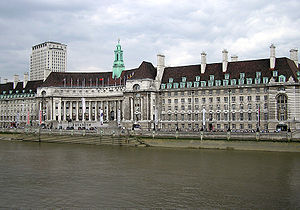Difference between revisions of "Greater London Council"
Ross Burgess (Talk | contribs) |
Ross Burgess (Talk | contribs) |
||
| Line 1: | Line 1: | ||
| − | [[File:County.hall.london.arp.jpg|thumb|County Hall, headquarters of the LCC and GLC]]The '''Greater London Council''' ('''GLC''') was created in 1965 as the top-level authority for [[Greater London]]. It replaced the [[London County Council]] but had a much larger area. Its powers included the fire service, emergency planning, waste disposal and flood prevention, but most other local government functions were given to the newly-created [[London Borough]]s. The GLC had responsibility for schools in Inner London (essentially the old LCC area) but this was given to the boroughs in the rest of Greater London. | + | [[File:County.hall.london.arp.jpg|thumb|County Hall, headquarters of the LCC and GLC]]The '''Greater London Council''' ('''GLC''') was created in 1965 as the top-level authority for [[Greater London]]. It replaced the [[London County Council]] but had a much larger area. Its powers included the fire service, emergency planning, waste disposal and flood prevention, but most other local government functions were given to the newly-created [[London Borough]]s. The GLC had responsibility for schools in Inner London (essentially the old LCC area) but this was given to the boroughs in the rest of Greater London. Its headquarters was in County Hall, on the south bank of the Thames opposite Parliament, which had previously housed the LCC. |
| − | In 1981 the [[Labour Party]] took control of the GLC and [[Ken Livingstone]] became its leader. He pursued a number of left-wing policies which annoyed the then [[Conservative]] government, leading to the abolition of the GLC in 1986 | + | In 1981 the [[Labour Party]] took control of the GLC and [[Ken Livingstone]] became its leader. He pursued a number of left-wing policies which annoyed the then [[Conservative]] government, leading to the abolition of the GLC in 1986. Responsibility for Inner London schools was passed to a new body, the [[Inner London Education Authority]] (ILEA), which continued to occupy County Hall. ILEA itself was abolished in 1990, and County Hall was then sold off. |
A new London-wide body, the [[Greater London Authority]] (GLA) was created in 2000, but with a different structure to the GLC. | A new London-wide body, the [[Greater London Authority]] (GLA) was created in 2000, but with a different structure to the GLC. | ||
Revision as of 12:12, 23 January 2014
The Greater London Council (GLC) was created in 1965 as the top-level authority for Greater London. It replaced the London County Council but had a much larger area. Its powers included the fire service, emergency planning, waste disposal and flood prevention, but most other local government functions were given to the newly-created London Boroughs. The GLC had responsibility for schools in Inner London (essentially the old LCC area) but this was given to the boroughs in the rest of Greater London. Its headquarters was in County Hall, on the south bank of the Thames opposite Parliament, which had previously housed the LCC.In 1981 the Labour Party took control of the GLC and Ken Livingstone became its leader. He pursued a number of left-wing policies which annoyed the then Conservative government, leading to the abolition of the GLC in 1986. Responsibility for Inner London schools was passed to a new body, the Inner London Education Authority (ILEA), which continued to occupy County Hall. ILEA itself was abolished in 1990, and County Hall was then sold off.
A new London-wide body, the Greater London Authority (GLA) was created in 2000, but with a different structure to the GLC.
LGBT history
The Gay Rights Working Party was created as a GLC committee in 1981. It published Changing the world: a London charter for gay and lesbian rights[1], and its work led to the creation of Galop.
